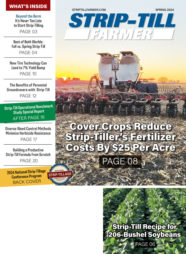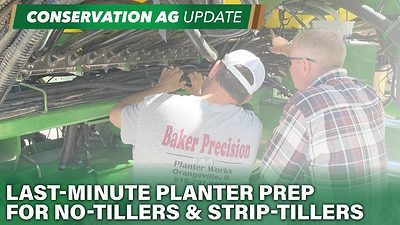By Edwin Suarez, MS, CCA, Technical Agronomist, Midwestern BioAg
Strip-till growers have been on the front edge of technology adoption and nutrient use efficiency for years. However when reviewing agronomy journals and past micronutrient research, you will see that very little has been done to understand and advance micronutrient management within strip-till programs.
The easiest and most common approach has been to mirror and implement conventional farming micronutrients programs into strip-till practices. As a result of this approach, there has been a general adoption of zinc and boron applications as an alternative for a more complex micronutrient management program.
However, strip-till growers must begin focusing on other micronutrients within the soil and benefiting from the yield potential that a complete micronutrient management program can provide.
So, what needs to be understood in order to manage micronutrients in strip-till farming?
1. Importance of Micronutrient’s Ratio and Rate
We know that zinc and boron are yield-limiting factors because of the micronutrient deficiencies found among soils throughout the Corn Belt. However, don’t mistake a micronutrient deficiency as being the same as incorporating a complete micronutrient plan. While deficiencies must be corrected, it’s important to apply the correct micronutrients rates and ratios each year in order to support the plant’s metabolic process and provide it with the correct ingredients to achieve its maximum yield.
2. High Quality Micronutrient Sources Improve Uptake and Prevent Toxicity
When it comes to micronutrients and applying them in strip-till zones, the ingredients are extremely important. Sulfate-based micronutrients are the best quality of micronutrients available for the plant and soil, due to the plant’s ability to more efficiently take them up without causing negative soil effects. Unfortunately, the majority of the micronutrient options within the market utilize “cheaper” sources such as oxide-based or sodium-based micronutrients. These ingredients will not only result in reduced micronutrient uptake by the plant, but can also negatively affect soil quality within the zone by increasing salinity levels and oxidizing/antagonizing other nutrients in the zone.
3. Importance of Nitrogen in the Application Zone
Studies made by Dr. Tony Vyn and Dr. Ignacio Ciampitti at Purdue University and Kansas State University show that nitrogen (N) applications increase micronutrient uptake in corn. The studies showed that N mobilizes nutrients into the plant, therefore making it a critical nutrient in this process. By understanding the importance of implementing a nutrient program that balances all nutrients, the crop will have the best ability to allow nutrients to work together and push the crop to its maximum yield potential.
4. Soil Health and Soil Biology in the Zone
We know that soil health and soil biology will improve macro and micronutrient uptake by the plant, and also reduce any toxicity risks and enhances nutrient cycling in the root zone. Adding rapidly available carbon to the application zone will feed soil biology, enhance soil health and improve nutrient uptake for better crop performance.
Overall, your strip-till operation can continue to push crops to their maximum yields by incorporating a carbon matrix, a complete sulfur-based micronutrient program and N into the zone. While it sounds like a lot to add, incorporating TerraNu MicroPack is an easy way to implement all of these components into your current custom blend. TerraNu MicroPack 2018 trial results displayed increased NUE, improved soil health, a yield boost and an average $18 ROI among corn growers who applied TerraNu MicroPack.
Strip-Till Farmer's Improving Soil Health in the Zone series is brought to you by Midwestern BioAg.
Click here to learn more about TerraNu Technology’s ability to enhance nutrient uptake, improve soil health and increase yields on your farm.
Edwin Suarez is a soil scientist who has focused most of his career in soil health. He has experience in academia/extension, industry and now the retail world. He received his bachelor’s degree in Sustainable Agriculture from EARTH University and his master’s degree in Agronomy/Soil Science from Purdue University. His work and research experience has been focused in soil health, soil fertility and plant nutrition. He has diverse experience working with multiple cropping systems, including corn, soybeans, wheat, cover crops, forages and potatoes. He is currently the technical agronomist for Midwestern BioAg.








Post a comment
Report Abusive Comment